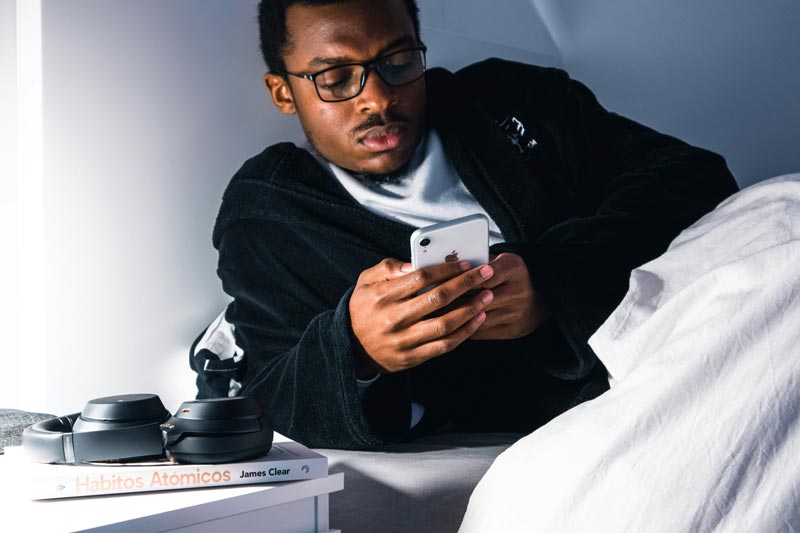As a college student, you’re probably juggling more tasks than a circus performer with flaming torches. Between lectures, study sessions, and social events, sleep might seem like a luxury reserved for the very lucky or very organized. But, let’s be honest—sleep is not just a luxury; it’s your secret weapon for staying sane and acing those exams. In this blog post, we’ll dive into why you should give your sleep routine the TLC it deserves and share some tips to help you catch those Z’s like a pro.
Why Sleep Hygiene Matters
Sleep hygiene might sound like a fancy term for making your bed, but it’s actually about creating habits that make you sleep like a baby, minus the midnight cries. Here’s why it’s crucial for college students:
- Brain Power Boost: A good night’s sleep does wonders for your brain, turning you into a memory maestro and concentration champion. Think of sleep as your brain’s personal power nap to keep it sharp and focused.
- Mood Magic: Ever notice how lack of sleep can turn you into a grumpy cat? Quality sleep helps you keep your cool and manage stress better. It’s your personal mood stabilizer, without the need for a mood ring.
- Health Hero: Sleep doesn’t just boost your brain; it keeps your body running smoothly too. Regular sleep helps fend off colds and keeps your metabolism in check—no more midnight junk food binges!
Practical Tips for Improving Sleep Hygiene
Ready to transform your sleep game? Here’s how:
- Stick to a Sleep Schedule: Try to go to bed and wake up at the same time every day. Think of it as setting a daily alarm clock for your internal clock. Consistency is key, even on weekends—because sleep is a discipline, not a weekend hobby.
- Design a Chill Bedtime Routine: Create a relaxing pre-sleep ritual. Maybe it’s reading a book, taking a warm bath, or doing some light stretches. Just avoid diving into social media or having deep philosophical debates right before bed—your brain needs downtime too.
- Optimize Your Sleep Environment: Make your bedroom a sleep haven. Keep it cool, dark, and quiet. Invest in a comfy mattress and pillows, and consider blackout curtains and white noise machines. Turn your bedroom into a sleep sanctuary, not a study zone.
- Limit Screen Time: The blue light from screens can mess with your sleep cycle. Try to unplug from devices at least an hour before bedtime. If you absolutely must use your phone, use blue light filters or glasses. Or just pretend you’re living in the ’90s and go old-school.
- Mind Your Munchies: Avoid heavy meals and caffeine before bed. Opt for a light snack that promotes sleep, like a small handful of nuts. Your stomach will thank you for not having to digest a five-course meal while you’re trying to sleep.
- Get Moving: Exercise regularly, but aim to finish your workouts a few hours before bedtime. Exercise helps regulate sleep patterns—just don’t turn your gym into a pre-bedtime rave.
- Manage Stress: Incorporate stress-busting activities into your routine, like meditation or journaling. Think of it as giving your brain a spa day before you hit the sack.
- Keep Naps Short: If you must nap, keep it to 20 minutes and do it earlier in the day. Long or late naps can interfere with your nightly sleep. Think of naps as mini-breaks, not full-on vacations.
- Limit Liquids Before Bed: To avoid those annoying nighttime bathroom trips, try to limit drinking liquids before bed. Your bladder will thank you for letting you sleep through the night uninterrupted.
How Our Psychiatry Practice Can Help
At our psychiatry practice, we understand the significant impact that sleep issues can have on your mental health and academic performance. If you’re struggling with sleep despite following good sleep hygiene practices, we are here to support you.
1. Comprehensive Evaluation
We offer a thorough evaluation to understand the root causes of your sleep difficulties. Our approach involves assessing your sleep patterns, lifestyle factors, and any underlying mental health conditions that may be contributing to your sleep issues.
2. Support for Co-occurring Conditions
If your sleep issues are related to stress, anxiety, or depression, we provide comprehensive support for these conditions as well. Addressing the underlying mental health issues can significantly improve your sleep and overall well-being.
3. Ongoing Monitoring and Support
We offer ongoing monitoring and support to ensure that your treatment plan is effective and adjust it as needed. Regular check-ins help track your progress and make necessary modifications to optimize your sleep and mental health.
Embrace Better Sleep for a Brighter College Life
To schedule an appointment or learn more about our services, please visit our website or contact us directly. Prioritize your sleep and mental health—because you deserve to feel your best, both academically and personally.
Prioritizing sleep hygiene isn’t just about catching more Z’s; it’s about boosting your brain power, mood, and overall health. Implement these tips to improve your sleep and enjoy a more balanced college life. Remember, a well-rested student is a happier, more productive student.
Sweet dreams!

